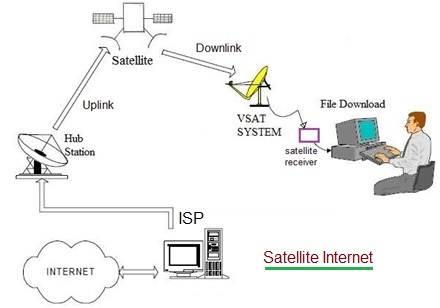Satellite Internet: 5 Advantages and Disadvantages
Advertisement
This page explores the advantages and disadvantages of Satellite Internet, outlining its benefits and drawbacks.
What is Satellite Internet?
Introduction:
When it comes to getting an internet connection, you have numerous choices these days. These include DSL lines, fiber optic connections, dial-up, and cellular connections (GSM, 3G, 4G LTE, and 5G). Satellite internet is another viable option.
Satellite internet relies on a network that includes a satellite and a hub station, as illustrated below. Small VSAT (Very Small Aperture Terminal) dishes are installed at the customer’s location, along with a satellite modem, to establish connectivity with the satellite. These satellites operate in various frequency bands, including C Band, Ku Band, and Ka Bands.
- C Band: Uses 5.925 to 6.425 GHz (uplink) and 3.7 to 4.2 GHz (downlink).
- Ku Band: Uses 14 to 14.5 GHz (uplink) and 10.95 to 11.7 GHz (downlink).
- Ka Band: Employs millimeter-wave frequencies ranging from 27 GHz to 40 GHz.

For all internet-related activities (browsing, sending, and receiving files, etc.), the connection from your computer or system travels to the Hub station via the satellite in space. Once a connection is established based on resource allocations (frequency/time) between the user’s VSAT, the satellite, and the Hub station, it functions like a leased line for internet requests/responses and data transfer.
Satellites are positioned approximately 36,000 km above the Earth, making them particularly useful in mountainous regions where other internet options might not be available.
Benefits or Advantages of Satellite Internet
Here are the primary advantages of using satellite internet:
- Faster than Dial-up: Satellite internet offers significantly faster speeds compared to traditional dial-up modem connections.
- Wireless Connectivity: It doesn’t require wired connections like phone lines, DSL, or coaxial cables, as the connection to the satellite is wireless.
- Scalability: Satellite internet relies on satellite bandwidth, allowing a large number of users to be accommodated based on their individual bandwidth requirements.
- Secure Communication: It provides secure communication through encryption units at both the Hub station and the VSAT sides (user premises).
- Accessibility: Satellite internet is readily usable in areas where other internet options are either unavailable or impractical to install. Moreover, a single satellite can serve users spread across a large area.
Drawbacks or Disadvantages of Satellite Internet
Despite its benefits, satellite internet also has some notable drawbacks:
- High Latency: There’s a delay of approximately 120ms for signals to travel from the dishes on Earth to the satellite and back. This results in a total delay of about 240ms for double hops. This latency affects all messages, including connection establishment and data transfer operations.
- Troubleshooting Complexity: Troubleshooting system faults can be challenging and requires advanced knowledge of satellite and VSAT technologies.
- Weather Sensitivity: The quality of satellite internet can degrade during adverse weather conditions.
- Signal Obstructions: Satellite signals can be attenuated by obstructions such as tree branches and buildings in the path between the VSAT antenna at the customer’s premises and the satellite. This is a significant issue for those living in densely forested areas. Proper alignment of the VSAT dish with the satellite is crucial to mitigate this.
- Limited Bandwidth and Cost: Satellite bandwidth is a scarce resource, which means that bandwidth per user is often limited and allocated based on service plans. This can make satellite internet more expensive compared to other options.
Advertisement
 RF
RF




